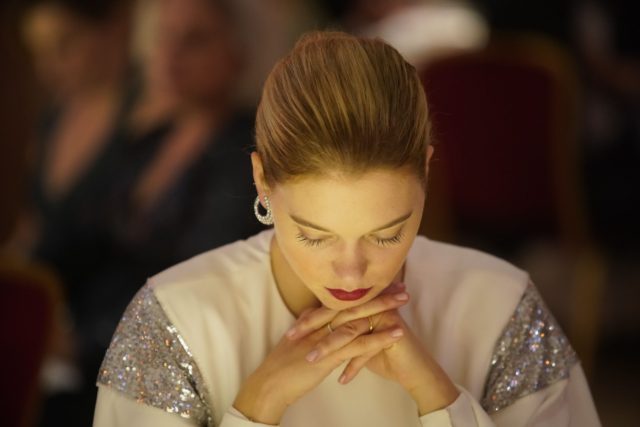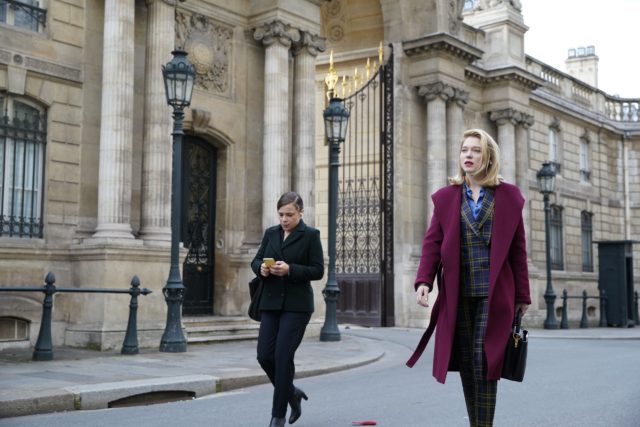
Léa Seydoux is radiant as a famous journalist facing a crisis in Bruno Dumont parable France
FRANCE (Bruno Dumont, 2021)
Film at Lincoln Center, Walter Reade Theater, Francesca Beale Theater
144/165 West Sixty-Fifth St. at Amsterdam Ave.
www.filmlinc.org
“Doing harm once doesn’t mean you’ll keep doing it. That said, if you don’t think someone can change. . . . You believe in nothing. Everyone can change,” an interview subject (Annick Lavieville) tells star television journalist France de Meurs (Léa Seydoux) in Bruno Dumont’s overstuffed social satire, France. The film’s title refers not only to the reporter but to the country itself, as de Meurs’s experiences are supposed to mimic those of the republic’s, although it’s not always clear how.
The film opens with France playing gotcha with President Emmanuel Macron at a press conference; reveling in her attack question, she makes funny faces with her producer, Lou (Blanche Gardin), as if Macron’s answers don’t matter. And indeed they don’t; on her flashy news show, A View of the World, the fearlessly ambitious France creates her own reality, whether it’s manipulating a meeting in the mountains with a Tuareg chief (Youannes Mohammed) battling ISIS jihadists, disregarding fans wanting autographs, hosting political debates on her program, or giving short shrift to her husband, Fred (Benjamin Biolay), and their young son, Jojo (Gaëtan Amiel). She is dismissive, cynical, selfish, and self-serving, as it’s all about the optics and furthering her furious need to succeed.
We might not like her — in fact, we might despise her, which is part of the point, as she represents the state of contemporary media — but every once in a while she lets some actual humanity seep in. When she accidentally injures a man named Baptiste (Jawad Zemmar), she seems genuinely concerned, as he is the sole support for his immigrant parents (Noura Benbahloouli and Abdellah Chadouat). But the North African family is so in awe that such a famous person is visiting them and trying to help, even though she caused the accident and injury, that they refuse to accept any money from her. It presages a later accident that will change her life in a very different way.
Written and directed by Dumont (Camille Claudel 1915, La Vie de Jésus), France keeps the viewer at a distance, perhaps just like the country does. Cinematographer David Chambille’s camera adores Seydoux (The French Dispatch, No Time to Die, Blue Is the Warmest Color), whether she’s dressed in glamorous outfits or wearing military gear in the middle of a firefight. Her shoulder-length blond hair and ruby-red lipstick light up the screen even when she is staring off into the distance, deep in thought that she is likely never to reveal, or perhaps even fully understand herself. France is like an old-fashioned movie star as the film comments on cinema itself in a digital age of reality television and the twenty-four-hour cycle of biased and fake news.

Lou (Blanche Gardin) and France de Meurs (Léa Seydoux) prepare to manipulate their next story in France
Dumont also takes on the social order. “The golden age of nations is over. Nations have lost their authority for good,” a speaker tells guests at a fundraiser. Talking about capitalism, redemption, and salvation, a man at France’s table says, “Believe me, we must give, we must give and keep giving. You won’t run out of money, we’re so rich. To die well, one must die poor. Once you’re dead, your kindness will remain.” But all of the kindness may have already been drained out of de Meurs, without her even realizing it.
The relationship between de Meurs and Lou evokes that of Midge (Rachel Brosnahan) and Susie (Alex Bornstein) on The Marvelous Mrs. Maisel, but here the pair of women are so unpleasant that you don’t want to see them together too much. And by the time we’re supposed to at last feel some sympathy and concern for France, it’s too late.
“France is sad,” a man says at one point. He could be referring to the country, the character, or the film itself.